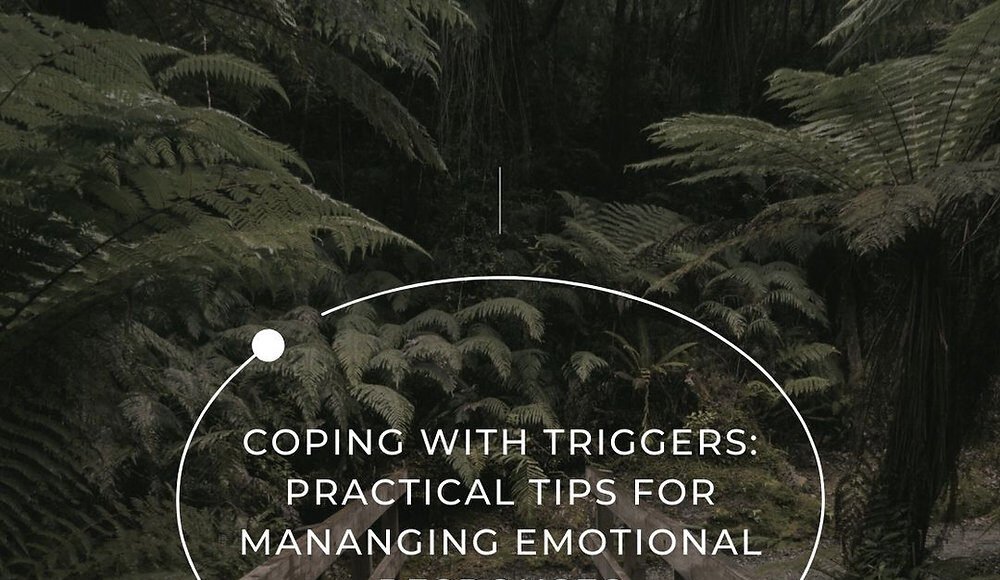Triggers are stimuli or reminders that evoke intense emotional or psychological reactions in individuals who have experienced trauma. These triggers can range from specific sights, sounds, smells, or situations that resemble the traumatic event, to certain thoughts or memories associated with the trauma.
Coping with triggers is an essential aspect of healing for trauma survivors, enabling them to manage their emotional responses and navigate daily life with greater resilience and stability. In this article, we will explore practical tips for coping with triggers, drawing insights from scholarly research and incorporating relevant scripture to provide guidance and comfort along the journey of healing.
The Role of Scripture in Coping with Triggers
Scripture offers comfort, strength, and wisdom to those who are struggling with emotional distress and trauma-related triggers. In Psalm 34:18, we find assurance that “The Lord is close to the brokenhearted and saves those who are crushed in spirit.” Throughout the Bible, we see examples of individuals who experienced trauma and found refuge, healing, and restoration in God’s presence. By anchoring our coping strategies in the truth of God’s word, we can find hope and solace in the midst of our struggles.
Scholarly Insights on Coping with Triggers
Research in the Journal of Traumatic Stress (Cloitre et al., 2009) highlights the importance of developing coping strategies to manage trauma-related triggers effectively. Coping skills such as mindfulness, grounding techniques, relaxation exercises, and cognitive-behavioral strategies can help individuals regulate their emotions, reduce the intensity of their reactions, and regain a sense of control over their lives.
Moreover, studies in the Journal of Clinical Psychology Review (Cusack et al., 2016) emphasize the role of exposure-based therapies in desensitizing individuals to trauma-related triggers and reducing their impact on daily functioning. By gradually confronting and processing triggering stimuli in a safe and supportive environment, survivors can diminish the power of triggers to provoke distressing emotions and memories. Be advised that the ethical practice for religious and nonreligious counseling centers alike is to have supervision on exposure-based therapy intervention methods to reduce harm to the client whether through a counselor’s actions or emotional/cognitive stimuli that occur because of treatment and dealing with trauma.
Practical Tips for Coping with Triggers:
1. Mindfulness Techniques: Practice mindfulness exercises such as deep breathing, progressive muscle relaxation, challenging and bringing thoughts captive, guided imagery to stay present and centered in the moment, reducing the intensity of emotional reactions to triggers. Philippians 4:6-7 states “Do not be anxious about anything, but in every situation, by prayer and petition, with thanksgiving, present your requests to God. And the peace of God, which transcends all understanding, will guard your hearts and your minds in Christ Jesus.”
2. Identify Triggers and Warning Signs: Learn to recognize your triggers and the early warning signs of distress, such as physical sensations, intrusive thoughts, or changes in mood or behavior, so you can intervene proactively before becoming overwhelmed. (Psalm 139:23-24 – “Search me, God, and know my heart; test me and know my anxious thoughts. See if there is any offensive way in me, and lead me in the way everlasting.”)
3. Develop Coping Strategies: Experiment with different coping strategies to find what works best for you, whether it’s engaging in creative activities, journaling, spending time in nature, or seeking social support from friends or loved ones. (Proverbs 12:25 – “Anxiety weighs down the heart, but a kind word cheers it up.”)
4. Create a Safe Space: Create a safe and soothing environment at home or work where you can retreat when triggered, surrounding yourself with comforting objects, soothing music, or calming scents to promote relaxation and emotional regulation. (Psalm 91:1-2 – “Whoever dwells in the shelter of the Most High will rest in the shadow of the Almighty. I will say of the Lord, ‘He is my refuge and my fortress, my God, in whom I trust.'”)
5. Seek Professional Help: If triggers are significantly impacting your daily life or functioning, seek support from a mental health professional who specializes in trauma therapy, such as cognitive-behavioral therapy (CBT), eye movement desensitization and reprocessing (EMDR), or dialectical behavior therapy (DBT). We can learn from James 5:16 that states “Therefore confess your sins to each other and pray for each other so that you may be healed. The prayer of a righteous person is powerful and effective.” We need to understand and acknowledge our weaknesses. Instead of being discouraged by our limitations, they should be the very thing that drives us to prayer. God’s power is made perfect in our weakness.
Coping with triggers is a challenging but essential aspect of the healing journey for trauma survivors. By drawing on practical coping strategies, seeking support from trusted individuals, and anchoring our efforts in the timeless truths of scripture, we can navigate the ups and downs of life with greater resilience, grace, and faith. As we lean on God’s strength and guidance, may we find comfort and courage in the knowledge that we are never alone, and that He is with us every step of the way.
Cloitre, M., Stolbach, B. C., Herman, J. L., van der Kolk, B., Pynoos, R., Wang, J., & Petkova, E. (2009). A developmental approach to complex PTSD: childhood and adult cumulative trauma as predictors of symptom complexity. Journal of traumatic stress, 22(5), 399–408. https://doi.org/10.1002/jts.20444
Cusack, K., Jonas, D. E., Forneris, C. A., Wines, C., Sonis, J., Middleton, J. C., Feltner, C., Brownley, K. A., Olmsted, K. R., Greenblatt, A., Weil, A., & Gaynes, B. N. (2016). Psychological treatments for adults with posttraumatic stress disorder: A systematic review and meta-analysis. Clinical psychology review, 43, 128–141. https://doi.org/10.1016/j.cpr.2015.10.003
New Living Translation Bible. (1973-2011). Biblica, Inc.






amoxicillin order – https://combamoxi.com/ buy amoxicillin sale
buy generic amoxil – buy generic amoxil for sale amoxicillin over the counter
diflucan 200mg pills – https://gpdifluca.com/# buy diflucan 200mg sale
where to buy fluconazole without a prescription – https://gpdifluca.com/# fluconazole 100mg price
buy escitalopram 10mg for sale – https://escitapro.com/ escitalopram 20mg cost
cenforce 50mg canada – https://cenforcers.com/ buy cenforce pill
purchase cenforce generic – https://cenforcers.com/# purchase cenforce online cheap
when does cialis go off patent – https://ciltadgn.com/ cialis price comparison no prescription
when will teva’s generic tadalafil be available in pharmacies – ciltad gn buy tadalafil online canada
tadalafil without a doctor’s prescription – where to buy tadalafil online purchase cialis
what is the generic name for cialis – on this site is generic cialis available in canada
order zantac 150mg sale – https://aranitidine.com/# generic ranitidine 150mg
viagra 50mg price – https://strongvpls.com/ viagra cheap overnight
cheap viagra canada pharmacy – how to buy viagra in spain 100mg viagra pill
More posts like this would make the blogosphere more useful. neurontin price
This is the gentle of criticism I in fact appreciate. prednisone dosage for colitis
With thanks. Loads of expertise! https://gnolvade.com/
More posts like this would make the online play more useful. https://gnolvade.com/es/como-comprar-cialis-en-es/
I am in point of fact happy to glance at this blog posts which consists of tons of profitable facts, thanks representing providing such data. https://ursxdol.com/cenforce-100-200-mg-ed/
This is the kind of delivery I turn up helpful. https://ursxdol.com/prednisone-5mg-tablets/
More content pieces like this would make the web better. tenormin cheap
This is the gentle of criticism I in fact appreciate. order metoprolol online cheap
More articles like this would remedy the blogosphere richer. https://aranitidine.com/fr/ivermectine-en-france/
The thoroughness in this draft is noteworthy. cenforce 100 en ligneen tablette
The depth in this serving is exceptional. https://ondactone.com/spironolactone/
I am in truth happy to glitter at this blog posts which consists of tons of of use facts, thanks towards providing such data. https://ondactone.com/spironolactone/
More delight pieces like this would insinuate the web better.
how to get tamsulosin without a prescription
I’ll certainly bring to review more.
cost levaquin 250mg
Greetings! Very productive suggestion within this article! It’s the petty changes which choice make the largest changes. Thanks a lot quest of sharing! http://sglpw.cn/home.php?mod=space&uid=562894
More posts like this would create the online time more useful. http://www.01.com.hk/member.php?Action=viewprofile&username=Ymvnrm
forxiga 10mg pill – order forxiga online cheap order forxiga 10 mg online cheap
order forxiga 10mg generic – buy forxiga paypal buy dapagliflozin 10mg generic
buy generic xenical for sale – https://asacostat.com/# xenical 60mg tablet
xenical pill – xenical pills buy xenical 120mg for sale
This is the stripe of glad I take advantage of reading. http://www.dbgjjs.com/home.php?mod=space&uid=532965
I am in truth delighted to glance at this blog posts which consists of tons of profitable facts, thanks object of providing such data. http://fulloyuntr.10tl.net/member.php?action=profile&uid=3230
You can keep yourself and your stock close being alert when buying panacea online. Some pharmaceutics websites operate legally and sell convenience, secretiveness, sell for savings and safeguards for purchasing medicines. buy in TerbinaPharmacy https://terbinafines.com/product/atarax.html atarax
You can shelter yourself and your stock by being wary when buying pharmaceutical online. Some pharmaceutics websites control legally and provide convenience, secretiveness, bring in savings and safeguards to purchasing medicines. buy in TerbinaPharmacy https://terbinafines.com/product/zantac.html zantac
This is a theme which is forthcoming to my heart… Myriad thanks! Faithfully where can I lay one’s hands on the connection details for questions? cialis super active sans ordonnance pas cher
More posts like this would persuade the online elbow-room more useful. aranitidine
Good blog you be undergoing here.. It’s severely to on high calibre article like yours these days. I truly appreciate individuals like you! Rent care!!
Good blog you procure here.. It’s severely to assign strong worth article like yours these days. I honestly appreciate individuals like you! Rent vigilance!!
online casino best payout
safe online casinos canada
best rated online casinos
best online roulette real money
$10 deposit online casino
online roulette unfair advantage
betmgm Nebraska betmgm-play mgm betting lines
mgm app promo online casino betmgm play betmgm pa casino
This quite praised sweepstakes principles, wowvegasus , brings factual casino thrills to your screen with no support necessary on core gameplay. Boasting millions of players and sinewy bonuses, it’s a go-to select conducive to fun, right community gaming across most of the US.
Unfold stories of triumph through every game played. crown coin casino login offers narrative-driven slots for depth. Story your way to success!
Explore endless avenues of entertainment and earnings. crown coins casino log in guarantees audited games for true fairness. Enter, entertain, and exit richer!
Spin into pure joy with Sweet Bonanza — where wins pay in any position and cascades keep coming! Unlock sweet bonanza multipliers free spins packed with 10x–100x bombs. Sweet success awaits!
Sweet Bonanza tempts you with colorful symbols and explosive potential. Land sweet bonanza pragmatic play 8+ matches anywhere and watch the wins roll in. Spin for glory!
Epic spins meet epic herds in slot heaven. buffalo slot free spins brings unlimited bonuses, multiplier stacks, and jackpot herds. Stampede in!
Epic spins meet epic herds in slot heaven. bull and games brings unlimited bonuses, multiplier stacks, and jackpot herds. Stampede in!
Ready for casino fun with real rewards? chumba casino real cash prizes free Sweeps Coins bonus lets you start winning immediately. Sign up and spin!
macumba gives you the best of both worlds: free play + real cash prizes. Claim your welcome Sweeps Coins now and start winning big. Fun starts here!